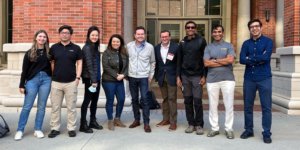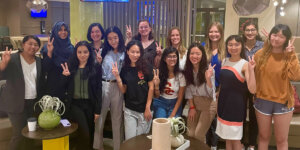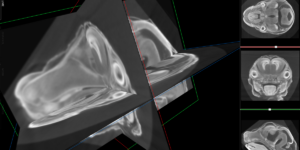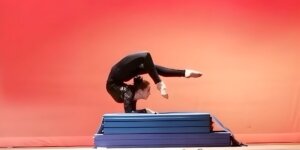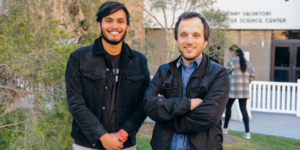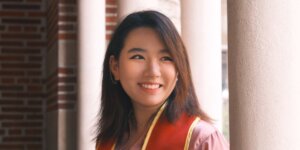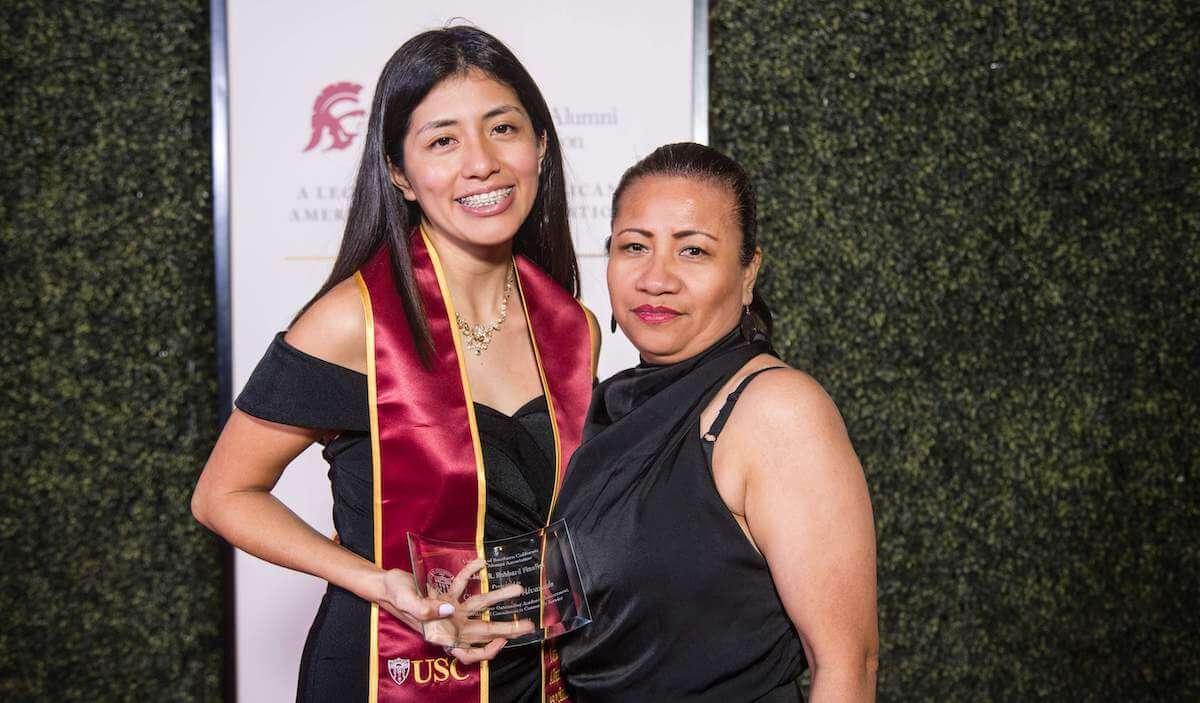
Cinthia Sanchez Alvarado and her mother Ana Alvarado. Image/Cinthia Sanchez Alvarado
Cinthia Sanchez Alvarado is lowering the ladder down behind her. The Class of 2024 graduate from the Daniel J. Epstein Department of Industrial and Systems Engineering wants to empower the next generation of engineers in the same way her own mentors helped her forge her unique path. Sanchez Alvarado developed a new outreach program through the Institute of Industrial and Systems Engineers. Her aim? To inspire young minds, particularly those from underserved communities, to move into ISE, building a more inclusive and engaged engineering community.
Sanchez Alvarado was recognized for her extraordinary outreach efforts with the 2024 Viterbi Community Impact Award. She was also honored with this year’s Viterbi Award for Women in Engineering.
Sanchez Alvarado spoke with us about her experiences at USC Viterbi School of Engineering.
Cinthia Sanchez Alvarado
B.S. Industrial and Systems Engineering
Hometown / Home country: Los Angeles / Oaxaca, Mexico.
What first inspired you to study engineering?
There were many teachers, mentors, and friends I have met throughout my life who have helped me develop my aspiration in engineering. I love building and creating solutions to problems. It was a way for me to express my creativity. But believe it or not, astrophysics inspired me to be an engineer. While I truly enjoy the logic and explorative nature behind math and science, my first love was the stars. I would look up to the sky and see how amazing it was — the natural, organized chaos. That love for the stars led me to explore engineering. I wanted to investigate what mimics the cosmos on the ground. Soon enough, I stumbled upon the field of engineering, where I saw a reflection of the universe in the everyday systems we use. I always remember that one of my mentors used to tell me that nature is the best engineer, and to this day, I strongly believe it is true.
What is something you’ve achieved while at USC Viterbi that you’re most passionate about?
I am most proud of all my mentees and all the people I have been able to inspire through outreach events. I am a product of outreach and mentorship. Without both of them, I don’t think I would have really stumbled across engineering or even survived the rigor of engineering. Outreach for me is extremely important. Not only does it inspire a new generation of problem solvers, but it inspires students to dream on. As an undocumented queer Latina woman from an indigenous background, it is crucial to be represented in the engineering field.
Outreach programs and outreach efforts were one of the main motivators in high school and allowed me to explore the field of engineering. Thus, bringing these programs and experiences to my community became of huge importance to me as I paved my way through USC. At the start of my USC career, I wasn’t sure that engineering was for me. It took me about five major changes to figure out what I was passionate about, and it came as a surprise for me. One of my mentors in my freshman year encouraged me to pursue ISE and look into it. At the time, he was soon to be an ISE graduate. I took his advice and took ISE courses until I discovered that this was the jam that satisfied my palate. It had taken me about a year and a half, about half my time at USC, to find out what industrial and systems engineering was. I told myself, “If only I had found this field earlier in my college career or even in high school.”
I noticed many programs offered a look at what I like to call the big five: mechanical engineering, electrical engineering, civil engineering, computer science, and chemical engineering. At least this was the case pre-COVID — this has changed. When I joined the Institute of Industrial and Systems Engineering’s (IISE) e-board there weren’t many outreach efforts. I knew what I had to do — establish ISE outreach!
My goal in the first year was to pilot the outreach program. We invited high school students from around the USC area, especially students from underrepresented backgrounds, to discover the wonder and applications of ISE in the real world. In the first year, we had about 30 students. It was a huge learning curve and something that took plenty of effort. With the help of IISE and the ISE department, our programming was successful, and many students enjoyed the content and left with a better understanding of ISE. I asked the students to send their thoughts to make programming better for the following year. The following year, although I wasn’t fully involved with IISE, I knew we had to continue making an impact in our community and encourage students to pursue ISE. We hosted our outreach program for the second time. Like in the past, we strategically hosted the event around college application season and strongly encouraged junior and senior high school students to participate. The second year we had an overwhelming 86 applications into our outreach program, which we had to cap to only 30-40 students.
Although my time at USC is ending, my vision is that this event gets hosted every year in the fall to continue encouraging students to pursue engineering but, most importantly, to showcase the importance of ISE and its application to the real world. From our queue line at Disneyland to the seats of racing cars and office chairs, from healthcare to the pilot’s cockpits. ISE plays such an incredible role and every day I am drawn more to it, something I hope to pass on to younger students.
Tell us about the research you have been working on.
When I started my time at USC, I was honored to join and work in the Signal Analysis and Interpretations Lab (SAIL) through the CURVE initiative. Not only was I able to strengthen my research and analytical skills by developing and designing analysis methods to determine patterns of music perceptions across different demographics (e.g., age, culture, gender, nationality), but I also found the creativity and art it takes to do research.
My initial thoughts when I heard about engineering research were completely turned upside down when I joined the lab. This experience opened my eyes to see that engineering was more than just building. It was about deriving knowledge from other fields, such as psycholinguistics, neuroscience, psychology, and many more. It was dynamic to see how engineering and research can help us better understand each other and simultaneously help us understand people, to create technologies that are geared to the population that needs such technology.
During the two years I was involved with the lab, I was able to present my research at the undergraduate symposium. This experience and research were taken further, as I began to think about how we design our technology and how interconnected it is with human psychology. I wondered more about the ways in which technology and its unique design can aid students with disabilities such as ADHD and autism — to aid in their learning and their exploration but, more importantly, consider their background and their parent’s understanding of technology. Our music perception research opened a space to think about the impacts of age, culture, gender, and nationality. It guided me through the rest of my time at Viterbi to think deeply about how we can make the way people interact with technologies and systems that are supposedly intended for them better.
Have you participated in any other extracurricular activities or organizations during your studies?
Yes! I have been involved in so many amazing organizations and activities during my time here at USC. Primarily, I was involved in Women in Engineering (WIE), where I was honored to be the director of mentorship, helping over 180+ women and non-binary students in Viterbi. I’ve also participated in general outreach through the Viterbi Impact Program, the K-12 Center, and Mathematics, Engineering, Science, Achievement (MESA). Furthermore, I am part of the Grand Challenges Program, which has taught me the value of Engineering+.
Outside of Viterbi, I have been part of Women in Politics as the Director of Diversity, Equity and Inclusion (DEI). I am also a fellow now at the USC Sidney Harman Academy for Polymathic Studies and involved with the USC Latino Alumni Association (USC LAA) as a scholarship recipient. Lastly, a friend and I co-founded an ethnic and cultural organization called Oaxaqueños de USC, which aims to create a space for indigenous students of Oaxaca or of Oaxacan descent.
What are your plans post-graduation?
This is a hot question, but I’m not sure! There are a lot of opportunities right now, including going to law school, working in industry, and even going abroad. Over the summer, I will be working at a law firm, so I am excited to start narrowing down my options.
Based on what you know now, what is your best advice for other students?
My advice is to take advantage of every single opportunity that comes your way. As cheesy as that sounds, it will make your college experience so much better. Go to guest lectures, go to class and get to know your professors, join a club, and if you don’t like it, try another one. There are so many things to do on campus, so take advantage!
What’s an area where you feel like you’ve really grown between your first semester of college and today?
I’ve grown in so many ways, academically, personally and spiritually. I recall being nervous about starting USC and I dealt with a lot of imposter syndrome at the beginning of my USC journey. However, as I continued to take advantage of opportunities and create my own space at Viterbi, I was able to thrive through the rigor. It was hard, but it was worth it.
Published on May 9th, 2024
Last updated on May 9th, 2024




